Research Fellow Spotlights
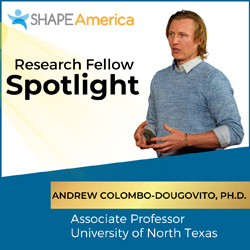
Spring 2024
The SHAPE America Research Council is delighted to shine a spotlight on Andrew Colombo-Dougovito, Ph.D., who was named a Research Fellow in 2021. Dr. Colombo-Dougovito is an associate professor at the University of North Texas. His research focuses on the justice-oriented strategies and policies that reduce the systemic barriers to physical activity and sport.
We hope you enjoy reading the Q&A below to learn more about his background and work!*
Can you tell us your background, including your journey into the field of physical education teacher education?
I stumbled into the PETE field and academia, unintentionally; in earnest, I didn’t know what I do now was even a “job” when I started my undergraduate degree at the University of Michigan. Despite having (some) career counseling, I had no idea of “what I want to be” and, in a lot of ways, still don’t. I knew that I enjoyed athletics and didn’t want a “desk job,” so, for no particular reason, I started out in athletic training — though, I quickly realized that this career was not for me. By some lucky happenstance, I made an advisor meeting with Pat Van Volkinburg (whom many Michiganders should recognize) and she suggested, “Why don’t you try physical education?” I said “ok” without any considerable contemplation and, quickly, found comfort in the classroom.
After graduating with my BS in 2009, I worked for several years as a public school physical educator in Michigan and Colorado, primarily teaching elementary-age kids. While teaching, I earned my master’s degree from Western Michigan University (2011) in adapted physical education, where I was introduced to the research process and first considered continuing my education at the doctoral level. In 2013, I started my Ph.D. at the University of Virginia under the supervision of Drs. Martin Block and Luke Kelly, successfully defending in 2017. I then accepted a tenure-track position at the University of North Texas and was tenured and promoted to associate professor in 2023.
What are some of your research interests?
Throughout my scholarship, teaching, and service commitments, I have sought to establish authentic collaboration with community partners and key interest holders to promote pragmatic, yet transformative solutions to the multiple marginalizations experienced by disabled individuals and their families throughout their lifetime. My research praxis focuses on critically examining the systemic social, environmental and political forces governing accessibility to sport and physical activity as well as capturing the seen and unseen influences of “society” on individual actions.
Using a pragmatic ontology and radical epistemology, I situate my work within ‘DisCrit’ scholarship — engaging both qualitative and quantitative methods — to produce research that closely aligns with the self-identified community needs so that individuals have greater agency in their physical pursuits and practitioners can better provide equal opportunities to community members at the intersection of multiple marginalization.
Who are some of your mentors? In what ways have your mentors inspired and supported you across your academic and professional career?
Pat V taught me the importance of PE, how to be an advocate, and how to “fake it ‘til you make it.” Drs. Block and Kelly constantly pushed me to think critically, while also giving me the confidence to pursue my questions. Drs. Suzanna Dillon, Karen Weiller-Abels, and Megan MacDonald helped me immeasurably with my transition from student to professor and were always available for a brainstorm or vent session (which were frequent). I thank them with my utmost gratitude. I’d like to also acknowledge Drs. Josephine Blagrave, Sean Healy, Justin Haegele, Scott McNamara, Barry Lavay, Dale Ulrich, Karen Gaudreault, Brian Culp, and JK Yun, whom have all impacted me in more ways than they know.
What are some of your future goals (service, research, presentations) you hope to achieve?
I have several book projects ongoing that I’m excited about being real in the world and will be submitting a Fulbright application this fall.
What has brought you the most joy being a professor in academia?
Witnessing the successes of mentees and students, as well as having the ability to pay forward a fraction of the kindness and support that I received — it’s honestly the only thing keeping me in academia.
What piece of advice would you give to graduate students and/or junior faculty who hope to be a SHAPE research fellow one day?
You must be your best advocate. Academia is relentless and will always ask more of you than it gives back; try to learn early that: 1) only you know how much time you have and you can say “no”; 2) there will always be something to write or grade, so take time for yourself; and 3) you won’t get anything done over a “break,” so just rest.
What are some of your hobbies outside of academia?
Whenever I get the chance, I’m typically outside — hiking, climbing, biking — with my spouse, Daniella, or our dog, Artemis.
*This interview has been edited for length and clarity.
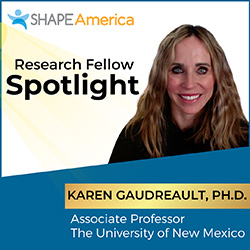
Winter 2024
The SHAPE America Research Council is delighted to shine a spotlight on Karen Gaudreault, Ph.D., who was named a Research Fellow in 2019. Dr. Gaudreault is the graduate program coordinator for PETE at The University of New Mexico.
Her research focuses on the marginalization of PE in schools, teacher socialization, and perceived mattering.
We hope you enjoy reading the Q&A below to learn more about her background and work!*
Can you tell us your background, including your journey into the field of physical education teacher education?
I grew up in suburban Kansas City and started swimming competitively at age 8. Around age 12, I became completely dedicated to competitive swimming for an Olympic development program, and in high school was training for two hours before and for three hours after school most days of the week. These experiences shaped my personal disposition, work ethic, and orientation toward achievement and goals. I swam at Northern Illinois University on scholarship, which is where I was introduced to physical education as a profession.
I graduated from NIU and went to UNC-Greensboro to study under Dr. Tom Martinek to learn about and work with TPSR while concurrently completing PETE. I stayed in Greensboro and taught elementary physical education for six years and experienced growing marginalization of my subject area, which provided me with much frustration. I was completely unprepared for the sociopolitics of teaching a marginalized subject, and it was a big reason why I ultimately left the classroom to pursue a career in teacher education and the Ph.D. program at the University of Georgia with Dr. Bryan McCullick. It was there that I learned that my experiences of marginalization were consistent with others, and I was immediately fascinated with learning as much as I could about this phenomenon for PE teachers and conducting research in order to understand this, how to overcome it (if possible), and how to ensure that preservice teachers are aware of what they will encounter.
What are some of your research interests?
I am deeply invested in understanding how physical education teachers feel and experience their work lives given that they teach a subject area that most do not understand and, as a result, marginalize. My early work was focused on marginalization and strategies to navigate school environments. Later, my work was framed using Occupational Socialization Theory to understand how PE teachers’ lived experiences shaped their perspectives through which they received marginality. This led me to explore the construct of perceived mattering as I was interested in understanding how the documented marginality and isolation influenced the degree to which PE teachers feel like they matter.
My work in perceived mattering with Dr. Kevin Richards and other colleagues has been some of the most intriguing and fulfilling research as it has provided me with additional insights into how teaching a marginalized subject impacts teachers. My research interests now are extending this work to include questions regarding the relationship between teacher emotions, appraisals of their environments, and their perceptions of mattering.
Who are some of your mentors? In what ways have your mentors inspired and supported you across your academic and professional career?
I have been truly blessed to have been mentored and guided by wonderful scholars and people throughout my PETE journey: Dr. Tom Martinek (UNCG), Dr. Bryan McCullick and Dr. Paul Schempp (University of Georgia), Dr. Jayne Jenkins and Dr. Mark Byra (University of Wyoming), Dr. Tom Templin (Purdue University), Dr. Amy Woods (University of Illinois), and Dr. Brian Culp (Kennesaw State University). Each of these individuals significantly shaped my knowledge, skills, and dispositions toward our profession, conducting teacher education that is student-centered, and conducting rigorous and meaningful research that can enhance K-12 PE and PETE programming.
There isn’t enough space here for me to describe how much these friends and colleagues mean to me or the multitude of ways they shaped me. I’ll just say I care for them deeply and am eternally grateful for their support and guidance.
What are some of your future goals (service, research, presentations) you hope to achieve?
This is an interesting question at this point in my career. At the current moment, I aspire to cultivate meaningful relationships with my doctoral students and junior faculty members, and to provide them with the support, care, and guidance that I was lucky enough to receive from the PETE community and my mentors listed above. I strive to use my professional work to help others, support K-12 teachers, and do whatever I can to contribute to creating positive PE experiences for children. Relationships and people are what is most important to me.
What has brought you the most joy being a professor in academia?
Without question, relationships and people. My PETE colleagues are dear to me, and my closest relationships are like my PETE family as they have brought so much to my life outside of academia and work. This includes students throughout my career who have become important in my life and in the lives of my husband and two children.
What piece of advice would you give to graduate students and/or junior faculty who hope to be a SHAPE research fellow one day?
First: Do research that you care about, believe in, and that makes you excited and fulfilled. Second: Invest in your relationships with mentors and colleagues and work together to produce work that is mutually beneficial and will lead to new and important questions. Third: Work hard and expect to work hard for a long time. Finally: Be actively engaged in our professional academy outside of your position at your institution as this will bring you important perspective, connections, and broaden your impact.
What are some of your hobbies outside of academia?
Spending time with my husband and two children. We are a very active family and spend most of our free time in soccer, rock climbing, running/hiking, camping, and exploring the beautiful state of New Mexico.
*This interview has been edited for length and clarity.
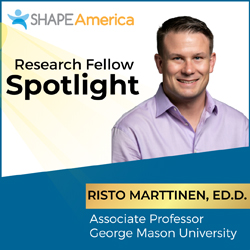
Fall 2023
The SHAPE America Research Council is delighted to shine a spotlight on Risto Marttinen, Ed.D., who was named research fellow in 2020. His discipline includes implementing educational after-school physical education programs in both elementary and middle schools in underserved
communities.
Dr. Marttinen is an associate professor in the College of Education and Human Development at George Mason University. Additionally, he hosts his own podcast called Playing with Research in Health and Physical Education, discussing current research and issues in the field of health and
physical education.
We hope you enjoy reading the Q&A below to learn more about his background and work!*
Can you tell us your background, including your journey into the field of physical education teacher education (PETE)?
My journey into teacher education has been a meandering one! I started off as a physical education major at Cal State Fullerton (CSUF). I went to observe some sub-par PE for one of my classes and changed my major! I went into health education instead and graduated with a degree in health
science with a minor in kinesiology. All through undergrad, I wrestled at CSUF. It has been a life-long passion.
Once I graduated I was offered a position as a graduate assistant and was able to enroll in the kinesiology master’s program, focusing on sports psychology. This led me to an assistant coach position and a few classes to teach as an adjunct in kinesiology and health. This is when I got
hooked to higher education! I loved teaching the PETE students and the structure and freedom of university classes. I went on to get my doctorate at Teachers College, Columbia University (New York) in 2015 and got my first tenure track job back at my alma mater! I was there for three years
and now am very happily at George Mason University in Virginia.
What are some of your research interests?
I am interested in sustainable and academically engaging after-school sports and physical activity programming. For 9 years I’ve researched REACH, which is an after-school program my colleagues Ray Fredrick and Kelly Johnston have helped build into a resource for students across the USA. I
specifically want to focus on delivering free out-of-school PA opportunities for youth. Within this research I also look at the integration of other academic subjects into PE as well as the integration of technology into PE.
Who are some of your mentors? In what ways have your mentors inspired and supported you across your academic and professional career?
My advisor in grad school was Steve Silverman. He taught me what a great mentor is and how they advise graduate students. Steve taught me how to write, and how to stay productive in research. He has been a fantastic mentor, and some of his strengths are how he helps connect young scholars to
the scholarly community at conferences. Through Steve, I’ve met countless scholars who I would not have had the courage to speak to at a conference. I also had a great set of mentors in my first job at CSUF who helped guide me in the tough navigation of academia.
I also think, in addition to a strong mentor, you must have a cohort of your peers to help guide your career. I’ve been fortunate to be able to surround myself with great up-and-coming scholars who help answer the tough questions I have, and give me feedback on articles, presentations, and
tough decisions we all need to make in this field. They have been tremendous collaborators across my time in higher ed.
What are some of your future goals (service, research, presentations) you hope to achieve?
I would love to continue building REACH out to become a sustainable program across a number of states. I think that has been my biggest struggle…the challenge of scaling up research to be used in areas where I (or the students from my university) are not present. That’s the overarching
research-service goal I have.
I want to stay active in my professional organizations and be able to give back to the community, especially graduate students and early career scholars. I’ve received so much support from scholars early in my career so I hope to be able to pay that back.
What has brought you the most joy being a professor in academia?
Study abroad programs and student major clubs! These two have been a way for me to engage with our students on another level. They have helped me get to know them better and to understand where they are coming from. I ran 3 study abroad programs at CSUF and have been working to build one out
here at Mason. In addition, I’ve been a faculty advisor for student clubs for 6 years. I think if you can form a solid group, you can build a fantastic camaraderie between students that makes for a lifetime of friendships.
What piece of advice would you give to graduate students and/or junior faculty who hope to be a SHAPE America Research Fellow one day?
Find more than one mentor and build a community of friends around your graduation year and lean on them. Regarding the mentor…most have a solid mentor from their doctoral program. Some have closer relationships than others with them, but either way, that should not be your only mentor. You
should seek people who can advise you on your specific university matters, people who can help in teaching, research and service.
And finally, regarding your peer group. If you don’t already have one, make one. Build a group of future scholars around you, meet at the annual conference and on Zoom several times a year. Add people to a text thread and ask these trusted people questions about academic life and any other
thing that you need. If you build a community around you, you’ll be better for it.
What are some of your hobbies outside of academia?
I used to wrestle and practice jiujitsu, which I LOVED. Unfortunately, I’ve retired after having a second back surgery. So for now, I spend my free time biking around Arlington with my daughter or going on hikes. I’ve also really gotten into gardening since I moved to Virginia. And every chance I get, I try to travel. Whether that is attached to a professional conference, meeting a colleague, or with family to unplug.
*This interview has been edited for length and clarity.
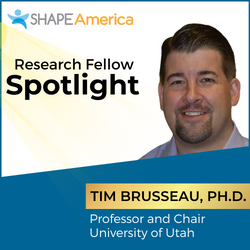
Spring 2023
The SHAPE America Research Council is happy to shine a spotlight on Tim Brusseau, Ph.D., who was named a Research Fellow in 2013. His discipline area is Physical Activity Promotion, and his research focuses on the role of youth physical activity programs in supporting a healthy and active life.
Tim is a professor and chair of the Department of Health & Kinesiology at the University of Utah.
We hope you enjoy reading the Q&A below to learn more about his background and work.*
Can you tell us a little about yourself and your background, including what drew you into the fields of health and/or physical activity?
I am from a working-class family and grew up in the rural village of Wood River Junction, Rhode Island, which was known for potato and turf farms. From an early age, playing sports and being active were all I really wanted to do. My primary sports were soccer and baseball but I also played basketball, wrestled, and threw the javelin for the track and field team. My dream was to be a college/professional athlete but also wanted to be a teacher and coach as I really looked up to my coaches and physical education teachers.
I attended Ithaca College as a first-generation student and earned a B.S. degree in health & physical education (K-12) and M.S. in exercise and sport science. While in Ithaca, I had the opportunity to work with the college’s softball and women’s soccer teams and was fortunate to be a part of a Division III national championship in softball. I also taught and was the varsity girls’ soccer coach at Ithaca High School. After completing my master’s degree, I became the head softball coach and coordinator for physical education teacher education at MacMurray College. During my time in Ithaca, I was fortunate to be mentored by Dr. Vic Mancini and his wife Joanne, who would encourage me to consider a Ph.D. program. I honestly never thought a Ph.D. was something I would consider but every time I would talk to them, they would tell me that I would be a great professor and could make an impact in higher education. This seed was always in the back of my mind and eventually, I decided to take that leap.
I attended Arizona State University for my Ph.D. and was very fortunate to have had tremendous support and mentorship from Pam Kulinna, Paul Darst, Hans van der Mars, Catrine Tudor-Locke, Bob Pangrazi, Chuck Corbin, and others. ASU provided an opportunity to develop skills as a researcher, teacher educator, and how to develop and implement physical activity programming in schools and communities. Upon completion of my degree, I spent four years on the faculty at SUNY Brockport where I was immersed into a terrific department where I learned how to be a faculty member and was part of a tremendous teacher education program.
For the past 11 years, I have been at the University of Utah where I am now the department chair, supporting 35 faculty, 5 staff, and 1,200 students. I have been very fortunate to have had great support and mentorship over the years as well as terrific students!
What is your primary line or lines of research?
My research is centered around understanding the intricacies of youth physical activity and working to improve access and opportunity for young people to be active so that they develop the skills to live a healthy and active life. Much of my work has centered around comprehensive school physical activity programs where I have been fortunate over the years to work with urban, rural, and American Indian community schools to help teachers and schools improve the physical activity opportunities for students. More recently, some of our work has shifted to working with college students during the COVID-19 pandemic to ensure access to healthy behaviors.
How you have worked alongside other professionals to promote health and physical activity?
A team approach is extremely important to be able to improve access and change behavior. You must empower and work closely with the teachers and principals in the schools you partner with and include experts in a variety of areas. I have worked with experts in nutrition, epidemiology, exercise prescription, psychology, etc. It is also essential to include parents and the children in the process so that they have ownership.
Can you give an example of how you’ve worked with local and community members to promote health and physical activity?
Much of our work involved partnering with schools and the community to promote physical activity and health. When we design programming, we want to know what is important to the students, their families, the community, and the teachers. For programing to be effective, the stakeholders need to have ownership and be a part of the direction. This is essential for any sustainable program.
What advice do you have for graduate students and junior faculty members who hope to achieve status as a SHAPE America Research Fellow someday?
Surround yourself with good people. Research requires a team effort and it is important to build relationships and trust within the group. It is also important to understand that it is all right to fail; often this is the time when the most learning takes place.
Lastly, what are some hobbies you participate in during your free time?
Much of my free time is spent with my family. I currently coach my daughter’s soccer team and participate in scouting with my son. I also enjoy lifting weights, hiking, and streaming a good TV series.
For more information about Dr. Brusseau,
view his university profile. He can be reached via email at [email protected].
*This interview has been edited for length and clarity.
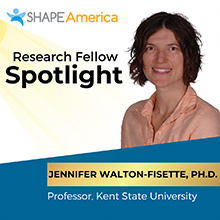
Winter 2023
The SHAPE America Research Council is happy to shine a spotlight on Jennifer Walton-Fisette, Ph.D., who was named a Research Fellow in 2017. Her discipline area is Physical Education Teacher Education, and her research is about social justice, equity, and policy.
She is a professor at Kent State University in the School of Teaching, Learning, and Curriculum Studies, and is also the director of educator preparation for the College of Education, Health, and Human Services.
We hope you enjoy reading the Q&A below to learn more about her background and work.*
Can you tell us a little about yourself and your background, including what drew you into the fields of health and/or physical activity?
I grew up working class in Woonsocket, RI, where I started playing Little League baseball when I was nine and basketball a few years later. Sport was everything to me growing up and certainly through my high school days. When thinking about college, I thought I wanted to become a coach, but there was no major in that, so I selected physical education. I enjoyed sport, being around and working with kids, and wanted to be in a profession where I was active. I didn’t do well my first year in college and almost dropped out. Fortunately, in my second year I started taking pedagogy courses and instantly fell in love with teaching. I knew that I was on the right career path.
I taught three years at the middle and high school level before taking a leave of absence to go to graduate school at Ithaca College (IC). I was drawn to the assistantship that worked with pre-service teachers, even though I had selected studying exercise physiology. After one semester I switched back to pedagogy as that is where my passion was and continues to be. My experiences at IC prompted me to leave a job I really loved (middle school PE and health) to enroll in a doctoral program at UMass-Amherst. Upon graduation from UMass, I was hired as an assistant professor at Kent State University in Ohio. I am currently in my 15th year and have been promoted to full professor and am the Director of Teacher Education for the university.
What is your primary line or lines of research?
After I got tenure and promotion, I compiled a research team to explore how sociocultural issues and social justice was integrated and/or enacted in physical education teacher education (PETE). We had scholars from the U.S., UK, and New Zealand on the team. Since then, my research has focused on social justice and equity issues in PE and PETE with an extended emphasis on policy — policy documents such as standards as well as policy more generally related to PE particularly at the state level. My scholarship will continue to delve in these areas in the near future, but always with a social justice and equity lens.
How you have worked alongside other professionals to promote health and physical activity?
All of my work — through my scholarship, service, profession development provided to teachers — has been in collaboration. Over recent years, I have engaged in research with Sue Sutherland at Ohio State University related to equity, justice, and policy work in PE teacher education. We have written a bunch together, but we also serve on our state association, OAHPERD, and engage in work at the community and state levels. I believe that our research, along with other scholars such as Brian Culp, Tara Blackshear, Dillon Landi, and Sara Flory have worked towards creating equitable, just, and safe spaces for young people to engage in health and physical activity. It is not necessarily the promotion of health and physical activity, rather, engaging with young people based on who they are and exploring the possibilities of an equity and just health-oriented and physically active world.
Can you give an example of how you’ve worked with local community members to promote health and physical activity?
Working collaboratively with our local community is critical as a teacher educator. I have provided professional development opportunities that range from equity and justice, trauma-informed practices, to state standards and assessments. I work with many local PE and health teachers and offer extensive advocacy related to health and PE, especially when it comes to navigating state legislation. I am out in the schools and build strong relationships with our local teachers as they are so critical in the success of our PE teacher education program.
What advice do you have for graduate students and junior faculty members who hope to achieve status as a SHAPE America Research Fellow someday?
It is so important to be true to yourself, to your philosophy, to what you stand for. It is not about seeking every publication possible. It is about engaging in scholarship that is meaningful to you and can have impact on the field — no matter if it is the hot topic or not. It was not ‘in’ when I engaged in activist and embodiment research with adolescent girls. And it certainly was not ‘in’ conducting research on equity and justice in PE when I first started. Getting Fellow status or any other award was not — nor has it ever been — a focus of mine. I just wanted to do good work. Do good work. Do meaningful work. Do work that you are passionate about. If you have the opportunity, find a colleague or two with whom you can collaborate. I mentioned Sue Sutherland earlier, but being able to collaborate on so many levels with her, having a trusting partner to help along the process is so critical. It does not have to be, nor should it be, done alone.
Lastly, what are some hobbies you participate in during your free time?
In my free time I like to be with my family — my wife, Theresa, son Quinn and daughter Harper. I like to exercise — jog, bike, hike. Attend live sporting events, concerts, and Broadway plays. I love traveling (though do not like to fly) and exploring the country and world. I hope to do more of that since it was put on a hiatus for three years. I am an avid Patriots, Celtics, Red Sox and Bruins fan. I also love to support Kent State sports and other events. Taking pictures. Maybe someday I will take photography classes and have a camera that is not an iPhone!
For more information about Dr. Walton-Fisette,
view her university profile. She can be reached via email at
[email protected].
*This interview has been edited for length and clarity.
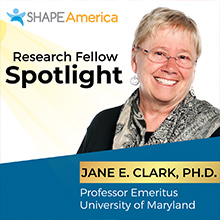
Fall 2022
The SHAPE America Research Council is happy to shine a spotlight on
Jane E. Clark, Ph.D., who was named a Research Fellow in
1985. Her discipline area is Motor Development, and her
research focuses on the development of motor skills in infants and young
children, with a special focus on those with movement difficulties.
Although Dr. Clark is retired, she is involved in mentoring future leaders,
leading a journal club, and contributing professionally to the literature.
Recently, she did a virtual research translational event for SHAPE America’s
Research Council.
We hope you enjoy reading the Q&A below to learn more about her background
and work.*
Can you tell us a little about yourself and your background, including
what drew you into the fields of health and/or physical activity?
My favorite subject in high school was physical education. As an
undergraduate student, I was challenged to do more by a professor, so I
did a senior thesis on how we learn motor skills. If you try to teach a
young child a skill and they can’t do it, you’re immediately struck with
why not. (For example, trying to teach a 7-year-old to hit a badminton
birdie). So, I became really interested in how we learn motor skills.
After graduation, I worked as an instructor at Purdue University, and
they had a program for preschoolers. I taught preschoolers how to swim
and it was the best part of my day. Because of my wonderful experience
at Purdue and the people that were there, I was pretty sure that I was
going to do my Ph.D. in motor development. I went to the University of
Wisconsin and got my degree there.
What is your primary line or lines of research?
I’ve studied the development of movement coordination and control. In
motor behavior there are three domains: manipulation, locomotion and
posture, generally. I’ve done research in all three. My first line of
work was the development of walking. If you study walking, then you have
to understand posture, so that was my next line of work.
Then, I became interested in studying children who have developmental
coordination disorder. That is when I went into motor learning, so I
went into adaptation and tasks such as reaching.
How you have worked alongside other professionals to promote health and
physical activity?
One of the things I’m proudest of is
Active Start, which
is a document that NASPE (now SHAPE America) first published in 2002. It
has since been modified by Jackie Goodway, Nancy Getchell and others.
When you teach, you touch a future. In all of my years of teaching, I’d
say I am proudest of my students. The students in my classes,
undergraduate students working in my lab, and those I’ve trained for
their master’s and doctoral work.
Can you give an example of how you’ve worked with local and community
members to promote health and physical activity?
When you’re first starting in your field, you have a lot more
connections with the community. When I was at the University of
Pittsburgh, I worked on a project where I went into the preschools in
Pittsburgh that were Title I schools.
I helped the preschool teacher figure out what to do in the preschool
that would help the children in their physical activity and in their
motor skills. By going to the centers, I could see the problems that
confronted teachers. I went all over the city of Pittsburgh, and we
eventually developed this idea of movement centers.
What advice do you have for graduate students and junior faculty members
who hope to achieve status as a SHAPE America Research Fellow someday?
Always be a learner. Be a lifetime learner. If you’re a lifetime
learner, you’ll always be curious, you'll always have questions, and
you'll always be interested in either pairing with someone who’s doing
research to answer those questions or you’ll be interested in developing
a different way to do it and then testing it out with other people and
coming to the conference and presenting your ideas.
So, think of yourself as a lifetime learner and then always think of
yourself as trying to challenge the ideas around you. For those who go
off into academics, stay connected to the real world. Don’t forget your
roots.
How have you supported SHAPE America, either through service, research,
or other ways?
I was recently involved in a virtual session to restart a special
interest group. By mentoring people, I have a couple of people that I
still work with on paper and I’m still writing and still contributing
professionally to the literature. Also, contributing to the development
of future leaders.
How has the COVID-19 pandemic impacted (or changed) your research agenda
and research productivity?
It’s actually connected me more with people because of Zoom. I’m on Zoom
calls about three to four times a week, talking with others about
research and organizational things. It’s caused me to be more
professionally productive.
For example, we had a meeting in Greece, which was accessible on Zoom.
Before the pandemic, grad students would not have been able to afford
flying to Greece from Brazil or from Australia. I now have good Greek
friends from meeting with them on Zoom. I would have loved to have gone
to Greece, but it’s particularly important for people from developing
countries to attend for a low price rather than flying there.
Lastly, what are some hobbies you participate in during your free time?
I enjoy reading, listening to audiobooks, and playing bridge, especially
during the pandemic.